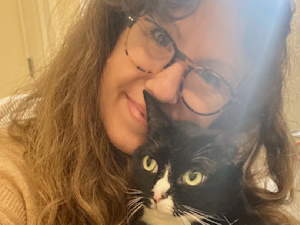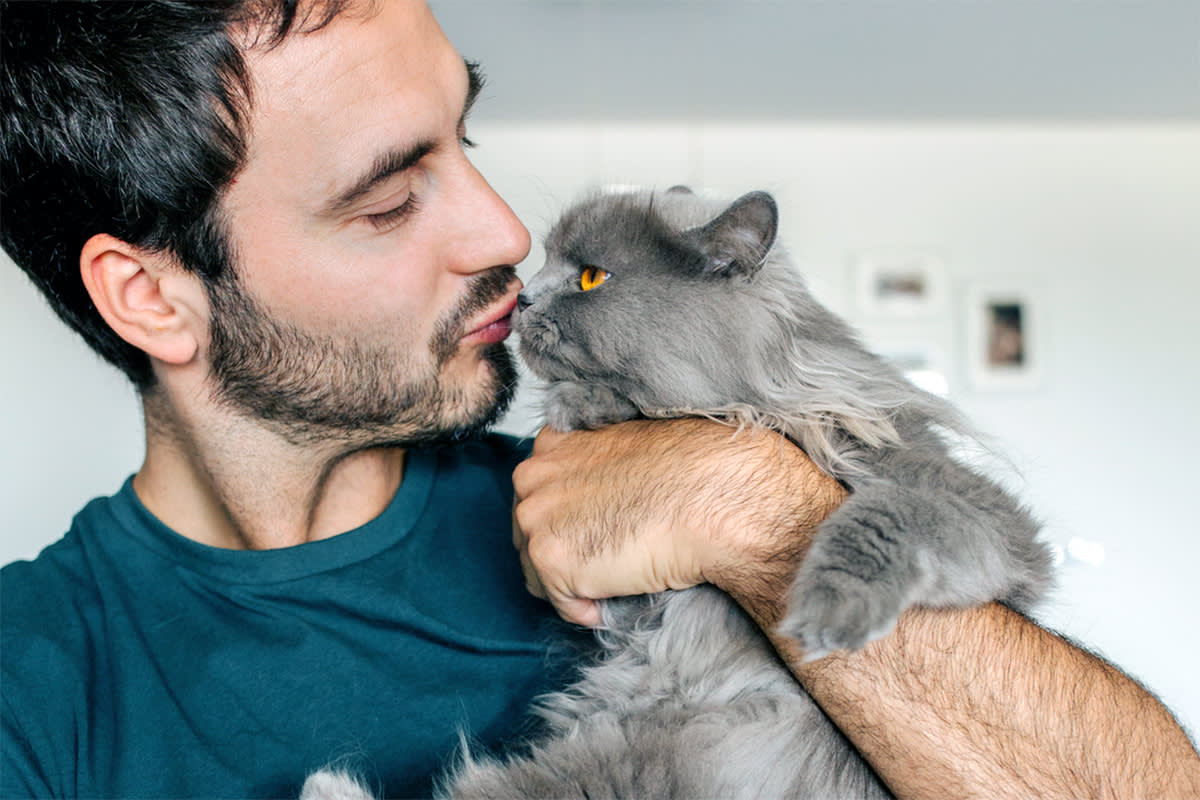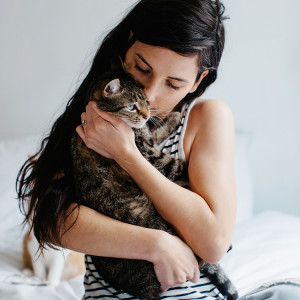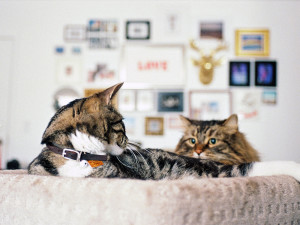Cats Actually Like It When You Talk in Your Baby Voice, Study Says
Is your cat ignoring you? Try making your voice a little cuter.

Share Article
I’ve never been big on baby talk. When my (human) children were little, I spoke to them in the same tone I used with adults — and the same goes for my cats. While I do call them silly things like Boo-Boo and Bubba (the cats, not the children), my delivery is matter-of-fact. “Hey, lovies,” I say when I walk in the door and see the three of them lined up, eyes boring into me accusingly. “I’m back. What’ve you been up to?” Usually, their response is to turn their backs on me and slink away, as if to punish me for leaving in the first place. Only later will they come over and cuddle with me on the couch, or rub against my legs as I unload the dishwasher.
Maybe, however, I wouldn’t get such a chilly reception if I got over my aversion to baby talk and adopted a sweeter, more sing-song tone. A 2022 studyopens in new tab headed by Charlotte de Mouzon of Paris Nanterre University studied the behavior of 16 cats when researchers played recordings of people — their parents as well as strangers — speaking in the way they normally speak to other adults, and also in a more typical sing-songy “Here, kitty-kitty” manner.
The cats were more responsive to the baby talk, as measured by behaviors like twitching their tails and ears and stopping what they were doing. Interestingly, they only responded to the baby talk when they heard it from a parent, not a stranger. The takeaway? Cats perk up when their parents sweet-talk them, but they ignore it when it comes from anyone else.
The idea that cats recognize their parents' voices is backed up by research from the University of Tokyoopens in new tab, which found that while cats do, indeed, know when their parents are talking to them, they tend to play it cool and pretend they didn't hear anything.

“The cats responded to human voices not by communicative behavior (vocalization and tail movement), but by orienting behavior (ear movement and head movement),” the study authors said. “This tendency did not change even when they were called by their owners.” Maybe they just need to be called in a sweeter tone of voice?
Do cats really like baby talk from their parents?
Reluctant to start using baby talk with my kitty crew without doing my own research, I asked several cat experts what they thought. Would my cats respond better to baby talk than to my deadpan delivery? And do they really recognize my voice?
“Every cat is unique and has their own personality, which means they may or may not respond to baby talk,” says Dr. Preston Turano, a licensed veterinarian. “It may work for your cat and create a positive and fun interaction or greeting, but for others it may be a calm, steady voice, hearing their name, playing with a feather toy, or sitting on the couch.” That’s good news for me; sitting on the couch is my love language — and my cats seem to be fluent in it, judging by how quickly they come to sit next to me as soon as I settle in.
Veterinarian Dr. Joanna Woodnuttopens in new tab, founder of Petlearniaopens in new tab, agreed that feline receptiveness to baby-talk varies from cat to cat. “I cant say I’ve noticed that cats are more likely to respond to a sing-song voice, though as a vet I do naturally adopt an overly-jolly-but-calm voice when talking to cats. It probably all comes down to what the cat is familiar with. If they are used to being talked to in a sing-song baby voice, that’s what they’ll respond to more..”
Veterinarian Dr. Amanda Chambersopens in new tab, a consultant for Embrace Pet Insuranceopens in new tab, has her own personal experience as a cat parent: “If they are hanging out upstairs and anyone else calls them to come down, they will not come, but as soon as I speak up, they will come running, regardless of if I say their name in a baby talk tone or just speak in my normal voice.” And veterinarian Dr. Kelly Diehlopens in new tab concurs: “As a veterinarian and cat owner, I absolutely believe that cats can recognize their parents’ voices. However, I’m not sure they respond better to baby talk than a regular tone. I think they simply respond to the owner.”
To bond with your cat, you can take other steps besides using a baby voice.
So, while the research indicates my cats might prefer it if I talk in a baby voice to them, the veterinarians I consulted are a little more skeptical. But is there anything else I can do to up my communication game with the little loves of my life?
“I think teaching your cats their name is step one to communicating with them, so they know you’re talking to them,” Dr. Chambers says. “Being consistent in the phrases you choose to use for their favorite things (i.e., treats, food, pets) helps them better recognize what you are communicating. Using a motion or sound, besides just a word, can help, too.”
Cat behaviorist Stephen Quandtopens in new tab told me that tuning in to the little things is key. "I think a lot of humans, who aren’t deeply versed in cat talk, hear and see only the most obvious forms of communication. Broaden your language skills so you can appreciate all the more nuanced ways in which cats talk to us, and you'll deepen your relationship with your cat in the process."
Now that my kids are grown and it's just the cats and me at home, I suppose there's no harm in talking baby talk to my cat babies. After all, no one is around to make fun of me — and it seems that they just might like it. I just hope my neighbors can't hear me through the apartment walls.

Elizabeth Laura Nelson
Elizabeth Laura Nelson is a writer and editor based in Brooklyn, New York, whose work has appeared in The New York Times, Jenny, Best Life, YourTango, Elite Daily, and more. She focuses her work on relationships, health and wellness, midlife, and lifestyle. As a child, Elizabeth was scared of cats (claws and teeth, yikes) but she has since gotten over her fear and now shares her home with three sweet and gentle feline companions who make life better (and cuddlier) every day.
Related articles
Can Cats Understand Humans and Language?
Great, one more thing for them to judge us on: our conversation skills.
Can Cats Smile? 5 Signs of Really Happy Cats
My, what lovely teeth they have...
![dark-haired woman hugging cat that has imprinted on her]()
10 Signs Your Cat Has Imprinted on You
Feeling like you have a little shadow these days? Here’s why that’s happening.
![Cat looking at laptop with woman at home.]()
Cats Associate Words With Images Faster Than Babies, New Study Finds
More proof that your cat is paying attention.
![Two cats laying on a cat bed in the living room looking at each other]()
Despite Their Mariah Carey Attitudes, Cats Know Each Other’s Names
They’d probably still say, “I don’t know her.”
![Man cuddling his gray cat.]()
Does Your Cat Think You’re Their Mom?
You love them like a child, but is the feeling mutual?








